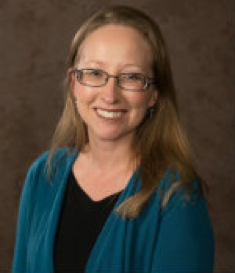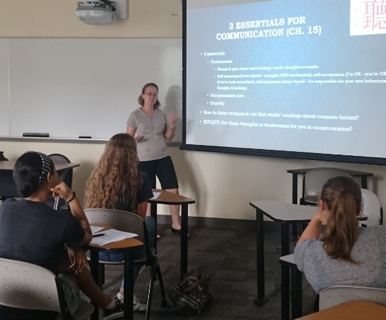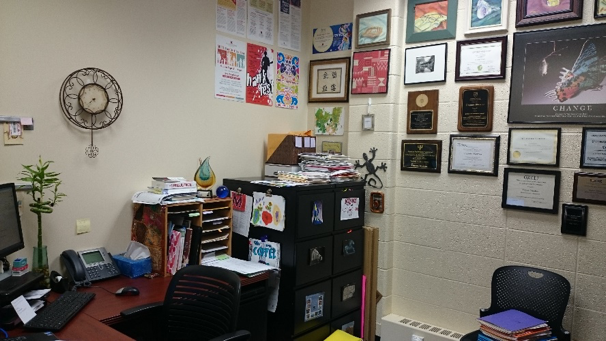 School name: Miami University Middletown
School name: Miami University Middletown
Type of college/university: State institution, regional commuter campus
School locale: Small town
Classes you teach: Introduction to Psychology; Foundational Experiences; Career Development; Psychology Across Cultures; Personality; Abnormal Psychology; Research Design & Analysis; Introduction to Counseling; Special Topics in Psychology; Psychology Capstone Experiences; Independent Studies in Teaching, Community Service, and Research
Average class size: 25-30
What’s the best advice about teaching you’ve ever received?
When I was in graduate school, Bill Buskist did a workshop just for our graduate student teaching cohort. In several ways, he not only discussed but modeled how our primary job as educators is to make learning real…and personal. He made every person in that small room matter. To this day, I’ve tried to remember to show instead of say what’s important. I use nameplates in my classes so that I know all students’ names within a few weeks. I am always looking for ways students can see or apply their lives in the constructs that we discuss in class. They may study a list of facts for an exam and remember it for a moment…but if they can see an idea in their lives, they will remember and revisit it much more often and more deeply. If they know we see them, they will feel they belong in higher education and be more eager to work for and learn from us.
What book or article has shaped your work as a psychology teacher?
Recently, I have been influenced a great deal by a series of works by one of my mentors and friends, career advising guru, Drew Appleby. See, for example, Appleby & Appleby’s (2006) Teaching of Psychology article entitled, How to Avoid Kisses of Death in the Graduate School Application Process. For years, I have taught psychology because I love the subject, and my students do, too. My students, however, do not always know how to translate this thing they like into a viable career or calling. If I cannot prepare them for life after graduation, I feel I am not doing my job. A lot of my emphasis on experiential learning – including service-learning, research mentoring, and community placements – is founded on the idea that I need to help provide them the skills and experiences they can sell in a job or graduate school interview.
Briefly tell us about your favorite lecture topic or course to teach. 
My absolute favorite class to teach is Psychology Across Cultures. Many young people do not yet grasp just how much their culture or cultures have shaped them. This seems especially true for a lot of my students who are White, working-class Americans, and/or first-generation students. I love exploring my students’ cultural identities, then having them learn about others, so that all can develop the three core components of intercultural competence: knowing about one’s self and other cultures, caring about culturally different others, and being able to act effectively and appropriately in new contexts.
Briefly describe a favorite assignment or in-class activity.
For my Psychology Across Cultures and Introduction to Psychology courses, I pair with English as a Second Language professors to have our U.S. domestic and international students perform a series of four shared cultural experiences across the semester in a program called Crossing Borders (Wickline, 2012). In large group and small group experiences, students discuss themselves, their families, and their cultures while experiencing new things together - for example, a basketball game, hayride, rodeo, pottery painting, bowling, or dinner at a new restaurant (perhaps with chopsticks). They learn to expand their comfort zones, try new things, and see new layers of similarities AND differences between themselves and others. When it works well, they stay in touch on WeChat or Facebook or develop organic friendships that last beyond the classroom and semester.
What teaching or learning techniques work best for you?
I am a huge advocate of active and experiential learning. For example, I can lecture about intercultural competence and empathy until I am blue in the face, and students will go, “Sure, sure. That’s important.” However, that does not touch them or teach them empathy. Instead, if I start the first five minutes of Psychology Across Cultures in sign language…then French…then Spanish instead of English…well, then students know for themselves, even if briefly, the frustration that English-learning international students go through almost every day of their lives in a new culture. I can talk about discrimination, privilege, or prejudice in the same way with the same effect. However, when our Crossing Borders partners go out to eat together in public, and people stare at them or make rude comments, then my domestic students know what it feels like to experience these things. In a similar way, service-learning helps students know what to do with the collection of facts they have learned in classes so they know things, not just know about things. I find most forms of active or experiential learning help students go much deeper on Bloom’s (1956) learning taxonomy when compared to lecture or reading alone.
 What’s your workspace like?
What’s your workspace like?
My workspace takes three forms. During the day, I am mostly in my office, which is decorated with photos, art from previous students and colleagues, and posters from large scale community events my students and I have hosted over the years. As I have a lot of community partners and mentees, my second workspace is the local coffee shop – planning meetings always seem to go better over shared food or a latte! My third workspace is my brown recliner, where I work in the quiet of the very early morning in my house, uninterrupted, before my family wakes up. Although it does not always work, this vampirish schedule enables me to keep more daylight, evenings, and weekends as sacred time, set apart from my job. I’ll admit I am giving up on work-life balance, for this seems to always make work and non-work life compete. My new goal is work-life integration, as both my family and my vocation are huge parts of who I am.
Three words that best describe your teaching style: Challenging, Supportive, and Personal
What is your teaching philosophy in 8 words or fewer? Get wet – you see rainbows when facing rain.
Tell us about a teaching disaster (or embarrassment) you’ve had and how you dealt with the situation.
One day in Psychology Across Cultures, we did what I call “Snowball Stereotypes.” Each person writes down a stereotype she or he holds (whether or not they believe it), crumples it up, and throws across the circle a few times until they are randomly distributed. We then flatten, read, and discuss them. The point is to show that stereotypes do not belong to any one group: We all have ones we working through, holding onto, or re-learning, and we have stereotypes about a wide variety of kinds of people (e.g., age, nationality, ethnicity, gender, sexual orientation, etc.). This particular day, several of those stereotypes were about African Americans. We ran out of time to mention how we often have these stereotypes but we want to unlearn them – or how our families gave them to us, but we are embarrassed by them. Thus, it sounded at first like these are all stereotypes to which my students were wedded. Two of my three students with African American heritage left angry and disheartened, which they shared with me in my post-class reflection assignment, noting they wish we had more time on the topic. Per their request, the next day back in class, we deferred the day’s topic and returned to stereotypes so the group could process and unpack everyone’s reactions. Both African American students showed relief, noting how important this was to revisit the topic and deepen the discussion so they could begin to trust our class (mostly White people) again.
What is something your students would be surprised to learn about you?
I could probably beat most of them at air hockey. I was a mime for 4 years in college – it’s part of what got me interested in the formal study of nonverbal communication, which I am still doing. Lastly, I have also travelled to 15 different countries (and mimed in 4 of them).
What are you currently reading for pleasure?
I am catching up some Malcolm Gladwell books on my own and loving Nick Bruel’s Bad Kitty series with my kids.
What tech tool could you not live without?
That would have to be my laptop with WiFi connection. Some days I cannot bear to sit in my office with no windows any longer and need to catch some sun, even if I am still working. There is a balcony at my office building that frequently beckons my name…
What’s your hallway chatter like?
It seems that higher education, like many careers, is asking for more and more of us with fewer resources, time, or staffing. We are all trying to work smarter, not harder, and find ways to manage the load. Particularly for my adjunct friends, that also means finding ways to manage the bills – part-time educators are so needed, so dedicated, and so underpaid. Some days “supporting each other” means sharing teaching joys and ideas over the copy machine. Other days it means sharing concerns and struggles over margaritas, coffee, or chocolate. Either way, my colleagues are some of the best and hardest working people I know. They care deeply, and they wear it on their sleeves, in their classes, day in and day out.
